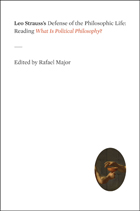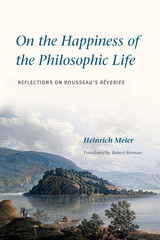2 books about Philosophic Life

Leo Strauss's Defense of the Philosophic Life
Reading "What Is Political Philosophy?"
Edited by Rafael Major
University of Chicago Press, 2012
Leo Strauss’s What Is Political Philosophy? addresses almost every major theme in his life’s work and is often viewed as a defense of his overall philosophic approach. Yet precisely because the book is so foundational, if we want to understand Strauss’s notoriously careful and complex thinking in these essays, we must also consider them just as Strauss treated philosophers of the past: on their own terms.
Each of the contributors in this collection focuses on a single chapter from What Is Political Philosophy? in an effort to shed light on both Strauss’s thoughts about the history of philosophy and the major issues about which he wrote. Included are treatments of Strauss’s esoteric method of reading, his critique of behavioral political science, and his views on classical political philosophy. Key thinkers whose work Strauss responded to are also analyzed in depth: Plato, Al-Farabi, Maimonides, Hobbes, and Locke, as well as twentieth-century figures such as Eric Voegelin, Alexandre Kojève, and Kurt Riezler. Written by scholars well-known for their insight and expertise on Strauss’s thought, the essays in this volume apply to Strauss the same meticulous approach he developed in reading others.
The first book-length treatment on a single book by Strauss, Leo Strauss’s Defense of the Philosophic Life will serve as an invaluable companion to those seeking a helpful introduction or delving deeper into the major themes and ideas of this controversial thinker.
[more]

On the Happiness of the Philosophic Life
Reflections on Rousseau's Rêveries in Two Books
Heinrich Meier
University of Chicago Press, 2016
On the Happiness of the Philosophic Life presents Heinrich Meier’s confrontation with Rousseau’s Rêveries, the philosopher’s most beautiful and daring work, as well as his last and least understood. Bringing to bear more than thirty years of study of Rousseau, Meier unfolds his stunningly original interpretation in two parts.
The first part of On the Happiness of the Philosophic Life approaches the Rêveries not as another autobiographical text in the tradition of the Confessions and the Dialogues, but as a reflection on the philosophic life and the distinctive happiness it provides. The second turns to a detailed analysis of a work referred to in the Rêveries, the “Profession of Faith of the Savoyard Vicar,” which triggered Rousseau’s political persecution when it was originally published as part of Émile. In his examination of this most controversial of Rousseau’s writings, which aims to lay the foundations for a successful nonphilosophic life, Meier brings to light the differences between natural religion as expressed by the Vicar and Rousseau’s natural theology. Together, the two reciprocally illuminating parts of this study provide an indispensable guide to Rousseau and to the understanding of the nature of the philosophic life.
“[A] dense but precise and enthralling analysis.”—New Yorker
The first part of On the Happiness of the Philosophic Life approaches the Rêveries not as another autobiographical text in the tradition of the Confessions and the Dialogues, but as a reflection on the philosophic life and the distinctive happiness it provides. The second turns to a detailed analysis of a work referred to in the Rêveries, the “Profession of Faith of the Savoyard Vicar,” which triggered Rousseau’s political persecution when it was originally published as part of Émile. In his examination of this most controversial of Rousseau’s writings, which aims to lay the foundations for a successful nonphilosophic life, Meier brings to light the differences between natural religion as expressed by the Vicar and Rousseau’s natural theology. Together, the two reciprocally illuminating parts of this study provide an indispensable guide to Rousseau and to the understanding of the nature of the philosophic life.
“[A] dense but precise and enthralling analysis.”—New Yorker
[more]
READERS
Browse our collection.
PUBLISHERS
See BiblioVault's publisher services.
STUDENT SERVICES
Files for college accessibility offices.
UChicago Accessibility Resources
home | accessibility | search | about | contact us
BiblioVault ® 2001 - 2024
The University of Chicago Press









